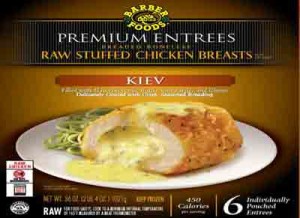The Centers for Disease Control and Prevention (CDC) has updated their investigation into the two Salmonella Enteritidis outbreaks in Minnesota and Wisconsin. One of the outbreaks is linked to Barber Foods frozen, raw, chicken products.
 In one outbreak, six people infected with this pathogenic bacteria are from Minnesota (5) and Wisconsin (1). Two persons have been hospitalized.
In one outbreak, six people infected with this pathogenic bacteria are from Minnesota (5) and Wisconsin (1). Two persons have been hospitalized.
In the other, three people infected with a different Salmonella strain in Minnesota have been reported. Two of those people have been hospitalized. Illness onset dates range from April 5, 2015 to June 23, 2015. No new illnesses have been reported since July 8, 2015.
The recall of Barber Foods raw chicken products was expanded on July 12, 2015 to include more than 1.7 million pounds of food. The products were sold under several different brand names, including Barber Foods, Meijer, and Sysco. The products have the establishment number “P-276” on the packaging. This is the Barber Foods Chicken Salmonella Recall List. Look it over carefully. If you have any of these products in your home, do not eat them. Discard in a sealed container or return to the place of purchase for a refund.
In addition, Omaha Steaks has just recalled frozen stuffed chicken breast products for Salmonella. They were manufactured by Barber Foods and sold under the Omaha Steaks label. Those products have the establishment number “P-4230A” on the packaging.
One of the problems with this product is that the breading can fall off before the chicken is cooked. And if the breading is contaminated with Salmonella bacteria, it could contaminate other surfaces and other foods.
Another of the problems with this product is that it can look cooked even though it is completely raw. This chicken should always be cooked to 165°F and checked with a meat thermometer. Several consumers have told public health officials they did that, which is worrying. See the CDC’s infographic about this issue.
If you purchased this product and got sick, see your doctor. Most people who are sickened with Salmonella get better within about a week, but some get so sick they must be hospitalized. The long term complications of a Salmonella infection can be serious, including arthritis and heart disease.
The symptoms of a Salmonella infection include nausea, vomiting, abdominal pain, diarrhea, fever, chills, headache, muscle pains, and blood in the stool. Those in high risk groups, such as the elderly and those with compromised immune systems, can suffer serious health consequences from this illness.




